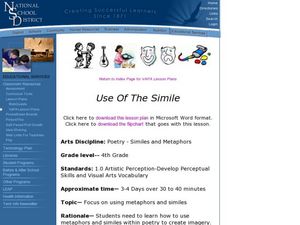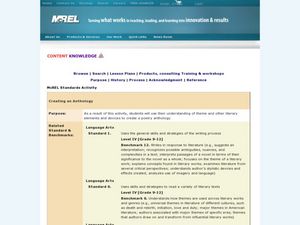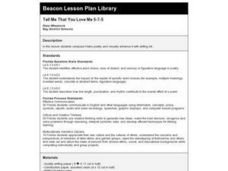Curated OER
Use of the Simile
Fourth graders identify and write their own similes. In this literary devices instructional activity, 4th graders define and identify similes. The teacher scaffolds the instructional activity so that all students can write their own...
Curated OER
Recognizing Similies: Fast as a Whip
Students review what they have already learned about similies and begin to engage with similies on a deeper and more abstract level as they create their own.
Curated OER
Where's Walden and Why Henry?
Sixth graders understand how Thoreau can serve as both inspiration and model for the investigation of home places. They explore ways to become better observers of natural and cultural history. Students find out how to connect with their...
Curated OER
Fall Similes and Metaphors
Young scholars interpret what a similies and metaphors are. They give examples of similies and metaphors. Pupils write different similies and metaphors using fall or autumn descriptive words. Students base their comparisons on facts,...
Curated OER
Similes and Metaphors
In this similes and metaphors worksheet, students write similes for seven given sentences and then change them into metaphors.
Curated OER
Metaphors
In this metaphor worksheet, students make a "word card" with the word metaphor for their vocabulary bank, then determine whether statement from The Dragonslayer are similes or metaphors,
Curated OER
Poetic Expression
Ninth graders evaluate the effectiveness of literary techniques including figurative language.
They demonstrate an understanding of the main ideas, events, or themes of a variety of novels, stories, poetry, other print material, and...
Curated OER
Model Lesson Plans
Ninth graders study how to identify and analyze the use of figurative language used in selected poems, short stories or other pieces of prose chosen by the teacher. These pieces of literature represent at least two pieces by one writer...
Curated OER
Identify Poetic Devices
In this poetic devices worksheet, students identify devices being used as alliteration, rhyme, onomatopoeia, rhyme, idiom, simile, metaphor, hyperbole or personification and explain their choice.
Curated OER
Ladybug Similes
In this simile worksheet, students review the definition and an example about similes. Students then write five similes about ladybugs, pick out the best one, and then illustrate it.
Curated OER
Imagery
Young scholars read the poem The Worker by Richard W. Thomas as an example of the effective use of imagery. Then they complete a 5-senses chart describing some part of nature, e.g. sea, clouds, etc. Then they write their own poem using...
Curated OER
The Poet's Message-"The Colored Soldier" by Langston Hughes
Students analyze the poem, "The Colored Soldier" by Langston Hughes to gain a greater experience of how poets use language to create meaning, influence thinking and thus become pioneers of change in American society. They work on the...
Curated OER
Creating an Anthology
Student compile a poetry anthology. In this literature lesson, students examine notable poetry anthologies. Students then select a theme to build their anthologies of 10 poems pertaining to their chosen theme.
Curated OER
Out of the Dust 4
Eighth graders read the novel, "Out of the Dust," and create a free-verse poem about a treasure of their own. They use the attached checklist to evaluate their own poem.
Curated OER
Octavio Paz
Tenth graders read and analyze the poem, "The Street," by Hispanic author, Octavio Paz. They research the life of Octavio Paz and identify his literary contributions. They complete an online scavenger hunt and create an author map of...
Curated OER
Memory of a Kiss
Third graders read, discuss, and memorize the poem "Jenny Kissed Me." as an example of lyrical poetry. They write a letter to Jenny reliving the memory of her kiss from an elderly person's point of view. They illustrate their poems.
Curated OER
Valentine Cinquain
Students review parts of speech by using Inspiration. They brainstorm vocabulary that fit a Valentines theme. Students watch as the teacher demonstrates the parts of a cinquain poem. Students write their own poem and create a KidPix...
Curated OER
Courage comes in all sizes: King Day
Third graders create a cinquain poem in groups about philanthropy and heroes. In this heroes lesson plan, 3rd graders review characteristics of heroes and how they demonstrate justice, kindness, and contribute to the common good. Then...
Curated OER
Nursery Rhymes
Students recall details of nursery rhyme read by teacher, identify main characters, and demonstrate knowledge of poem by creating concept map about story that includes title, clip art, and changes in font and color.
Curated OER
Allegorical Meaning in Edgar Allen Poe's The Masque of the Red Death
Tenth graders recognize the allegorical meaning in The Masque of the Red Death by Edgar Allen Poe. In this poetry lesson, 10th graders analyze a poem for allegorical meaning.
Curated OER
You Kiss the Book: Shakespeare's Romeo and Juliet
Students analyze imagery in Shakespeare's, Romeo and Juliet, and act out the passage to see how the author includes stage directions with his poetry.
Curated OER
Tell Me That You Love Me 5-7-5
Young scholars listen to several examples of Haiku poetry and discuss the strict format. Then students create and edit their own Haiku poems and enhance them with ink designs.
Curated OER
"I Can” Common Core! 6th Grade Reading
It is much easier for kids to know they have reached a goal when that goal is clearly defined. By providing sixth graders with a checklist of Common Core reading standards written in "I can" format, each child can keep track of his own...
Curated OER
English Literature: An Overview
Relate literary works and authors to the major themes of English literature from the Anglo-Saxon period through the 20th century. Working in groups, high schoolers will evaluate period philosophy, religion, and politics that influenced...

























